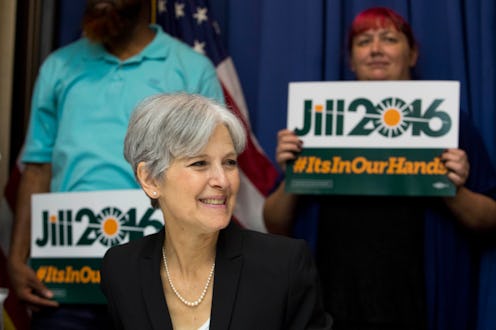News
Why You Should Watch The Green Party Debate
The 2016 presidential primary race is down to Sen. Bernie Sanders, Hillary Clinton, and Donald Trump, right? Not even, but you're not likely to hear much about the other candidates. That's because they aren't running on the Democratic or Republican tickets. The Green Party actually has five candidates seeking its nomination, and three of them will be participating in a debate on May 9: Jill Stein, Kent Mesplay, and Sedinam Kinamo Christin Moyowasifza Curry. One good reason to watch the Green Party debate, either live or at a more convenient time, is to familiarize yourself with a party founded on a staunchly progressive platform. And of course, knowing all your options come November is never a bad thing.
The Green Party debate will be hosted by RT America and will be broadcast on their station live at 4 p.m. ET. You can also stream the debate on RT's YouTube channel, or their website. The event will end at 6 p.m. ET. This timing isn't exactly the most convenient for many Americans, for whom work schedules will likely interfere with the ability to watch live. But you can always catch a recording of the event on YouTube at a time that works for you.
This might be your only chance to see the Green Party candidates debate, since you're not likely to see such an event on most media networks. It's highly improbable that a third-party candidate would win an election, so they aren't taken very seriously.
The United States implements a winner-take-all method of allocating its electoral votes. In such a system, two somewhat moderate parties tend to crop up which approximately represent the views and values of most of the electorate. That's at least partly because of the "spoiler effect." For example: If Sanders ran as an independent or with a third party in the general election, he'd probably get some votes that would otherwise go to Clinton, making it more likely that Trump would win.
But political tides are changing, with more Americans identifying as independent than as either Republican or Democrat. And this trend may be the reason for the state of the 2016 primary election, which features a total outsider as the presumptive Republican nominee and a Democratic Socialist making huge waves on the Democratic side.
This shaky political climate could mean that third parties in the United States are more relevant than they have been for some time. The Green Party may be of especial interest at this moment, as many of their policies align with what Sanders has been pushing for — only they take some of those policies even farther left.
Unlike Sanders' Democratic bid, the Green Party candidates aren't pushing the boundaries of their party's platform. The party has been, and remains, staunchly progressive. Key tenets of the Green Party platform of 2014 include cutting the military budget by half, abolishing nuclear weapons, reducing greenhouse gas emissions by 95 percent by 2050, a universal guaranteed income, and single-payer universal health care. Tune in to the Green Party debate, whenever you can, to see what a progressive party is all about and learn the differences between its candidates.
